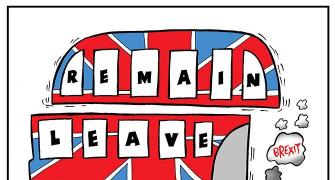
British Prime Minister Theresa May on Wednesday told Conservative MPs that she would step down before the 'next phase' of Brexit negotiations.
She, however, did not name a departure date at the at the ruling party's influential 1922 Committee meeting.
James Cartlidge, one of the MPs present at the private meeting at Westminster in London, told reporters, "She (May) said she would not remain in post for the next phase of the negotiations, the implication being that once the Withdrawal Agreement has passed, she would make way for someone else."
The latest development comes as MPs seize control of the Commons agenda to hold votes on alternatives to the deal.
In a major blow to May, MPs had voted through the debate earlier this week to seize control of the business of the House away from the government and set a new precedent in order to weigh up alternatives to the British Prime Minister's twice-defeated EU divorce bill through a set of 'indicative' non-binding votes.
She faced further humiliation on Wednesday as the MPs' motion passed with 331 to 287 votes -- a majority of 44 -- setting the stage for votes on a series of Brexit alternatives later in the day.
May has already declined to commit herself to backing any option thrown up as a result of such a vote as it could prove 'undeliverable'.
"I must confess that I am sceptical about such a process of indicative votes. When we have tried this kind of thing in the past, it has produced contradictory outcomes or no outcome at all...
"No government could give a blank cheque to commit to an outcome without knowing what it is," she told MPs.
However, she is under mounting pressure from all sides of the House, with her own party demanding her resignation as a price for backing her withdrawal deal and the Opposition Labour Party accusing her of failure by running down the Brexit clock to leave MPs with very little time to debate options.
In the current scenario, the Commons entered into uncharted territory on Wednesday when it first debated a business motion put forward by former Conservative Party minister Oliver Letwin, who is being 'prime minister for the day' as he is in charge of setting the course for the debate.
As many as 16 options were on the table for MPs to thrash out, including revoking Article 50 to reverse Brexit altogether, putting May's deal to the public for another referendum with an option to remain in the EU, and staying closely aligned with the European economic bloc's norms as part of a softer Brexit.
At the end of the debate, once the motion cleared the Commons, Speaker John Bercow whittled down all the options into an effective shortlist of eight choices for votes.
Such a vote itself sets a new precedent by handing out ballot papers to MPs to mark their preferred choice in a Yes or No format rather than the usual way of registering their verbal votes with parliamentary clerks in the Commons Lobby.
The Speaker will then announce the final count in favour of all options.
While MPs have demanded a free vote in such a ballot, it remains to be seen if parties will whip their MPs to vote in a certain direction. There are fears of more Cabinet resignations if Theresa May attempts such a parliamentary whip.
"MPs should be free to vote as they see fit. This is bigger than all of us, bigger than the parties; it's country first," said former health minister Steve Brine, who resigned on Monday to back the motion that led to Wednesday's indicative votes move.
The nature of this voting process will be determined by the Speaker, who has selected eight options for the ballot paper -- a no-deal Brexit on April 12; proposal for a Common Market 2.0 with the EU; proposal for single market membership with the EU; proposal for a Customs Union with the EU; the Labour Party's plan to find an alternative Brexit deal; proposal to revoke Article 50 if the alternative is a no-deal Brexit; proposal for a second referendum; and proposal for a trading relationship with the EU in case of a no-deal Brexit.
While the votes are being counted, the Commons has another important motion to debate on Wednesday, which is to formally change Brexit Day on its statute from March 29 to April 12.
That date has now already effectively been changed in international law after the EU agreed to an extension to the Article 50 mechanism last week, but requires a kind of rubber-stamping by the British Parliament.
The process of MPs keeping control of Commons business is likely to spill over into next week, when they are expected to find ways of implementing any workable solutions thrown up by the indicative votes this week.
Next Monday, the UK's most-signed online petition calling for Article 50 to be revoked and Brexit to be cancelled is also set for a debate in the Westminster Hall complex of Parliament. The petition, which attracted nearly 6 million votes, received a formal government response as is customary for popular petitions.
"It remains the government's firm policy not to revoke Article 50. We will honour the outcome of the 2016 referendum and work to deliver an exit which benefits everyone, whether they voted to Leave or to Remain," the UK Department for Exiting the EU statement read.
The EU has given May until April 12 to propose a different way forward if her divorce bill does not clear the United Kingdom Parliament hurdle.










